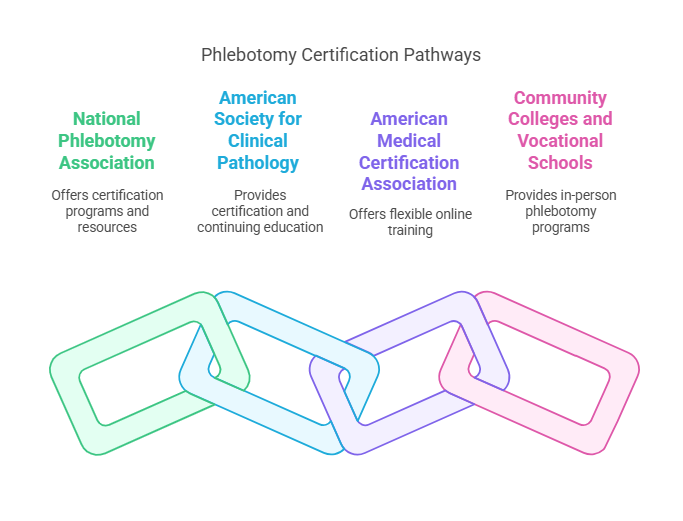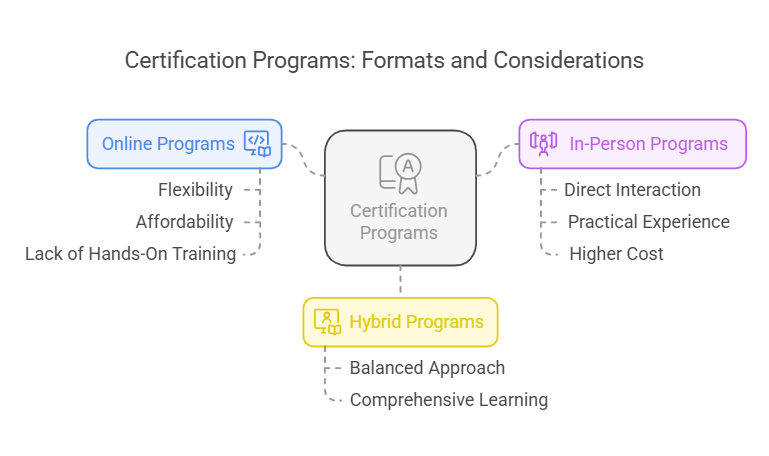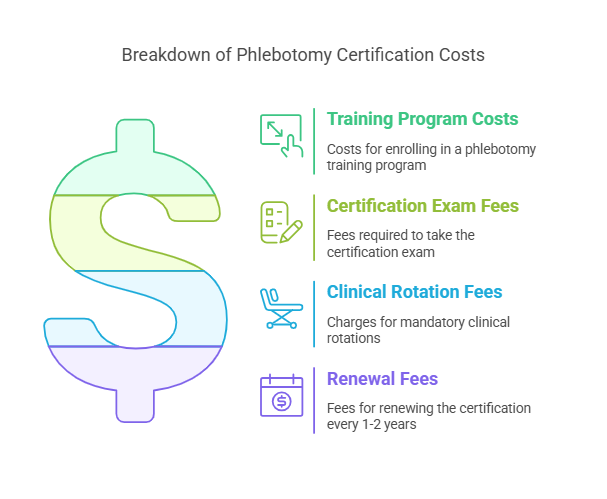Understanding the Cost of Phlebotomy Certification: A Complete Guide
Phlebotomy certification is an essential credential for professionals who collect and process blood samples for laboratory testing. It ensures that a phlebotomist has the necessary skills to perform venipunctures safely and efficiently. Many states mandate certification, and most healthcare facilities prefer hiring certified professionals due to their expertise in handling patients and maintaining laboratory protocols. This certification plays a crucial role in improving diagnostic accuracy and patient care.

Benefits of Becoming a Certified Phlebotomy Technician
Obtaining a phlebotomy certification comes with several advantages, including:
Expanded job opportunities in hospitals, clinics, and diagnostic labs.
Higher salary potential compared to uncertified professionals.
Better patient care and safety due to standardized training.
Professional recognition within the medical field.
Opportunities for specialization in fields like clinical pathology and research.

Phlebotomy Training and Certification Options
Several organizations provide phlebotomy certification, including:
National Phlebotomy Association (NPA) – Offers certification programs and resources.
American Society for Clinical Pathology (ASCP) – Provides certification and continuing education.
American Medical Certification Association (AMCA) – Offers flexible online training.
Community colleges and vocational schools – Provide in-person phlebotomy programs.
To become certified, candidates must complete an accredited training program and pass a certification exam.

Online vs. In-Person Certification Programs
When choosing a certification program, individuals must decide between online, in-person, or hybrid learning formats.
Online Programs: These provide flexibility and affordability, making them ideal for individuals with busy schedules. However, they may lack hands-on training, which is essential for mastering venipuncture techniques.
In-Person Programs: These offer direct interaction with instructors and practical experience but may be more expensive and require commuting.
Hybrid Programs: A combination of online coursework and in-person clinical training, offering the benefits of both formats.

Eligibility and Certification Exam Costs
To qualify for certification, candidates typically need:
A high school diploma or equivalent.
Completion of a recognized phlebotomy training program.
A passing score on a certification exam.
The certification exam costs range from $50 to $150, depending on the certifying agency. Additional expenses include practice exams and study materials, which vary based on the provider.
Cost of Phlebotomy Certification in 2025
The total cost of obtaining a phlebotomy certification varies depending on factors like location, institution type, and program length. Below is an estimated breakdown:
Training program costs: $700 – $3,000
Certification exam fees: $50 – $150
Clinical rotation fees (if required): $100 – $500
Renewal fees (every 1-2 years): $75 – $200
The overall cost can range from $850 to $3,650 in 2025, with urban areas generally having higher tuition fees than rural regions.

Financial Aid and Scholarships
To reduce the financial burden, prospective phlebotomy students can explore the following options:
Scholarships and grants offered by healthcare organizations.
Employer-sponsored tuition reimbursement for current healthcare employees.
Federal financial aid programs, such as FAFSA, for eligible students.
Career Opportunities and Salary Impact
Certified phlebotomists have a broad range of employment opportunities in hospitals, diagnostic labs, blood donation centers, and outpatient clinics. There are also possibilities for career advancement into supervisory roles or specialized areas like pathology and forensic science.
According to 2025 data, certified phlebotomy technicians earn an average annual salary of $44,500, with potential increases based on experience, location, and employer type. Certification can boost earnings by up to 20% compared to non-certified phlebotomists.
6 Lesser-Known Facts About Phlebotomy Certification
Not all states require certification, but it significantly improves job prospects.
The U.S. Bureau of Labor Statistics notes that while some employers may prefer candidates with professional certification, it is not always required.
bls.gov
Phlebotomists can specialize in areas like pediatrics, forensic phlebotomy, and research.
Specializations such as pediatric and forensic phlebotomy are available, offering diverse career paths within the field.
diversityemployment.com
Certification must be renewed periodically, usually every 1-2 years.
Certification renewal typically occurs every two years, requiring continuing education credits to maintain active status.
phlebotomy.school
Some hospitals provide free training in exchange for a work commitment.
Certain institutions offer free training programs with the condition of a work commitment post-certification, addressing workforce needs.
vocationaltraininghq.com
Mobile phlebotomy is a growing field, offering flexibility for independent professionals.
The rise of mobile phlebotomy services provides professionals with flexible work arrangements, meeting patient needs outside traditional settings.
diversityemployment.com
Virtual reality (VR) training is now being integrated into some phlebotomy programs for a hands-on learning experience.
Some programs incorporate virtual reality training to simulate phlebotomy procedures, enhancing hands-on learning experiences.
medvr.education
FAQs About Phlebotomy Certification
-
Most phlebotomy training programs take 4 to 8 months, followed by certification exams.
-
Yes, some organizations offer online coursework, but in-person clinical training is required for hands-on experience.
-
While some states and employers don’t require certification, it significantly improves job opportunities and salary potential.
-
The National Phlebotomy Association (NPA), ASCP, and AMCA are among the most recognized certification providers.
-
Yes, FAFSA, employer-sponsored tuition programs, and scholarships can help cover the cost of training.
Conclusion
Phlebotomy certification is an excellent investment for those pursuing a career in healthcare. In addition to medical billing and coding certification, obtaining certification in these fields can significantly boost one's career prospects. While the cost varies depending on location and program type, numerous financial aid options can help reduce expenses. Certification not only enhances job opportunities but also leads to higher salaries and career advancement, especially through reputable institutions like AMBCI.
